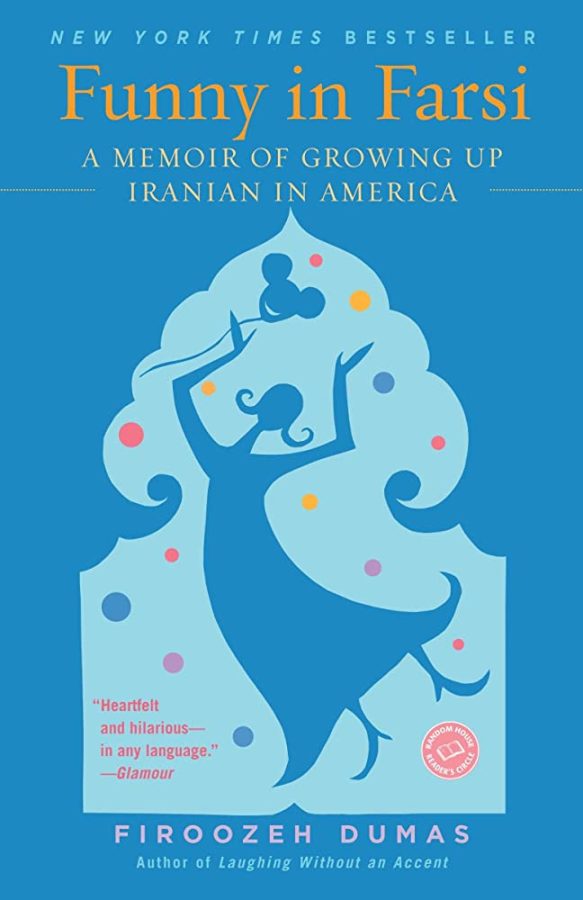Book Review: Funny in Farsi, by Firoozeh Dumas
June 1, 2023
Before I discuss Funny in Farsi, I want to share how I learned about it. 2022-2023 AP Lang students may recall that on the exam, the first reading passage was an excerpt from a memoir by an Iranian-American author. I really enjoyed it, and wondered what book it was from. After the exam, I looked it up and discovered the book was called Funny in Farsi—which I then checked out from the library and read within a week. Credit to College Board for their good taste!
Funny in Farsi by Firoozeh Dumas is told in a series of chapters that encapsulate experiences and recollections of Dumas’ life and family, while she grew up in both Iran and America in the 1970s and 1980s. Funny in Farsi was laugh-out-loud funny, heartwarming, and poignant. Dumas describes her family with detail, care, and love, recounts various life experiences with wit, and maintains a largely positive attitude throughout her stories.
Dumas’ Iranian identity features prominently in Funny in Farsi, and she lovingly discusses Iranian traditions and culture. One chapter of her memoir centers on the Persian holiday of Nowruz, which is the New Year. When she lived in Iran, Nowruz was a big deal, and celebrated joyously and happily by her family and others. She describes the details of the holiday: how it starts at a different time every year—because it starts exactly on the spring equinox, down to the minute—and how it is surrounded by visits to friends and family, and trays of homemade sweets for the kids. The holiday is beloved to Dumas and others with her heritage. Another part of Iranian/Persian tradition she looks fondly on is Persian food—including “eggplant or okra stew, fresh tomatoes, and tiny cucumbers. . . .” Meals in Iran were prepared carefully and meaningfully: “There was no such thing as canned, frozen, or fast food.” The amount of detail she uses conveys her love for Persian food and meals, and how significant they are to her. Throughout the book, this is a common theme, as Dumas looks upon her Iranian heritage with love.
However, like with many parts of the book, these discussions of Iranian tradition and culture are juxtaposed with her life in the US. Dumas does this with wit; following a description of Persian meals, she tells the story of her uncle who came to live with her family in America for a year. Upon coming to the US and eating significant amounts of fast food, he gained a lot of weight, and consequently embarked on various ridiculous attempts to lose weight, including a skin tight body suit and a girdle. Dumas’ writing is light, demonstrating the humor she and her family lived with, and their love for each other. This humor appears as a theme throughout the book, whether Dumas is sharing experiences of people mispronouncing her name in a medical waiting room (“Fritzy Dumbass”), or her father’s translation adventures, attempting to translate “hot dogs” and “sloppy Joes” when her family first moved to the US. This humor and lightheartedness makes the characters feel immediate and real, as it emphasizes their quirks and habits. Furthermore, Dumas’ use of incredibly specific memories, from her family’s vacations to Las Vegas to her attempts to learn to swim, draws an intricate and personal portrait of her life. Combined, the memoir is touching and funny.
Largely, Funny in Farsi is a positive book. Dumas’ experiences, however frustrating they may have been in the moment, are expressed in a positive, retrospective light. Though this is undeniably more enjoyable and fun to read than a book full of suffering and pain, it struck me as a unique and interesting rhetorical choice. In one chapter, Dumas writes, “almost every person who asked us a question asked with kindness.” This is a positive recollection, and is different from some other memoirs of American immigrants, or immigrant families, like Go Back to Where You Came From by Wajahat Ali, where the authors share terrible experiences of xenophobia. It is unfair to say that Dumas expresses experiencing no xenophobia; in one chapter, she describes the violence of anti-Shah demonstrators when her family was in Washington DC celebrating the visit of the Shah. However, there still is this persistent attempt to gloss over difficulties with humor and lightheartedness. And while she mentions anti-Iranian sentiments in other chapters, she never delves into them. This was a fascinating aspect of the book; it was an interesting choice on Dumas’ part to focus on the happier, lighter parts of her life.
Dumas tells her life with care, passion, and humor, though, all throughout the book. This made Funny in Farsi thoroughly enjoyable and heartwarming, as well as meaningful and thoughtful. I walked away from it thinking about my own family and life experiences, and how it is possible to have a positive outlook on nearly anything.




